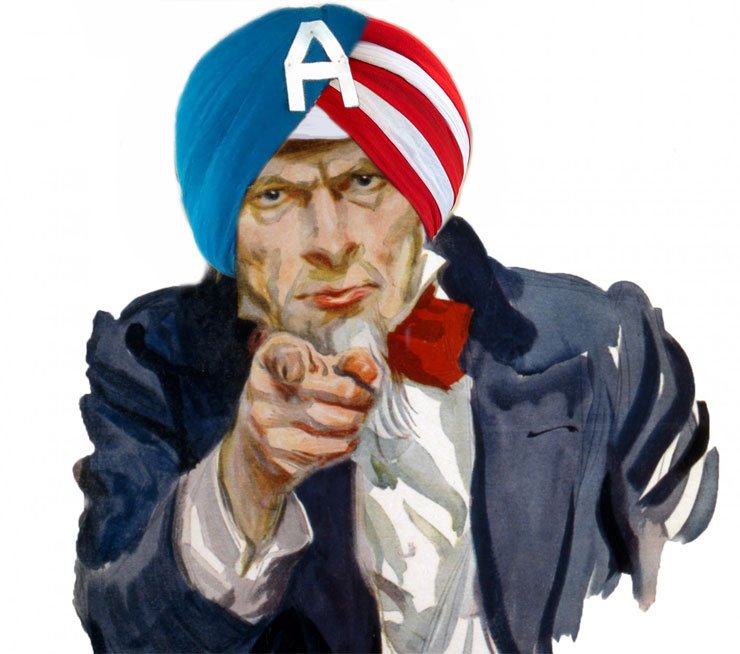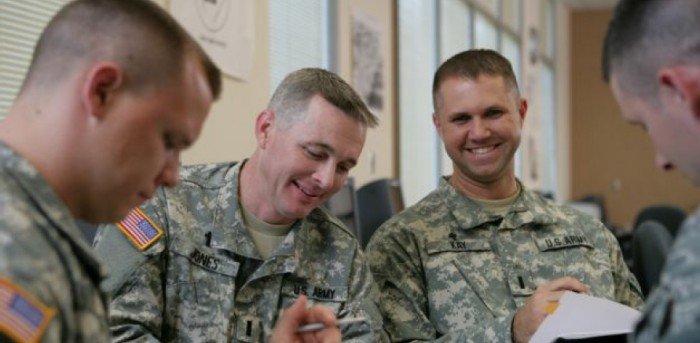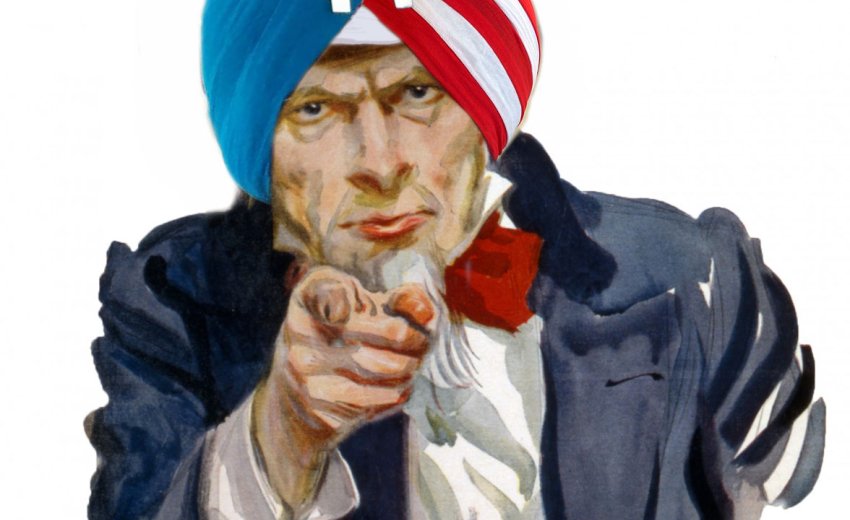A time for Sikh Chaplains in the US Military
Chaplain Corps of the US Army
By Parampreet Singh (William Coen)![]()

Introduction
A chaplain provides much need pastoral care to all members of his or her unit, the pastoral aspect of a chaplain is very important to unit morale, regardless of the chaplains faith he is there to guide all members of his or her unit. A chaplain also is a member of the Unit Chain of Command, this means that he or she has the ear of the commander and can mediate many issues that occur within a unit. India Defense calls a chaplain as Religious Teacher (RT). Apart from the general duties of a chaplain a Sikh Chaplain would be able to bring Sangat to all Sikh members of the US Armed Forces.
The statistics are that in the US Military we currently have 10 Observing Sikhs, 500 Practicing Sikhs and over 1,000 non-practicing Sikhs currently serving in all branches of the US Armed Forces. On Wednesday March 9th, 2016 I had a phone meeting with the World Religions and Cultural Conflicts Instructor at the US Army Chaplains School at Fort Jackson South Carolina, which trains all Chaplains serving the spiritual needs of the US Armed Forces. This report will express the views and opinions of CH Major James Kline US Army Chaplains Corps.
Chaplain Kline's perspective
CH Kline is very well versed in Sikhism, as a religious scholar CH Kline has several Observing Sikh friends and a copy of the Guru Granth Sahib in his home and has on numerous occasions visited Gurdwaras in his native town on Chicago, Illinois.
There is no official census of religious demographics currently available, because the Personnel Files are kept confidential. Another contact of mine who is a retired Marine, he is working on getting an official census of religious demographics in the US Armed Forces. In recent years Buddhist and Hindu Chaplains have been added to the ranks of the US Military Chaplains Corps. CH Kline believes that by having a Sikh Chaplain in the US Army it would fill a much needed spiritual gap as well as bring the rich strong Spiritual and Cultural aspects of Sikhism to the US Armed Forces.
Spiritual Equality through Education
I suggested to CH Kline that all Chaplains should have one on one contact with a Observing Sikh during their training at the US Military Chaplains school. Some of my suggestions were to bring the class on a field trip to the local Gurdwara to feel the Gurdwara experience. CH Kline is highly in favor of implementing this education in the near future. CH Kline and I are on the same page that the best way to bring Spiritual Equality to the US Armed Forces is through educating the Spiritual Leaders of the US Military Chaplains Corps.
One of my future projects is to create and implement a Religious Tolerance and Understanding (RTU) will be a training course that all service members must once a year.
All members of the DOD and DHS Family will benefit RTU because it will help to end Sikhaphobia and Islamaphobia. RTU would be a mandated training for all DOD and DHS Employees similarly to other mandated trainings such as: Sexual Harassment and Prevention, Suicide Prevention, Personal Gifts and Ethics.
Example, in 2011 when the Don't ask Don't Tell (DADT) Policy was repealed allowing GLBTQ service members to have equal rights in the Armed Forces. The leadership at the Pentagon had been developing a Servicewide training about the new policy. Once the members of all units of each branch of service had been briefed up on the new policy and the changes that will take effect. This training was highly successful to squah homophobia in the Armed Forces. Sikhaphobia and Islamaphobia are very different in nature but still the discrimination is just as bad.
Impact on Sikhs and their Comrades in Arms
In the 1989 film Field of Dreams, Ray the hero of the film was a farmer whofs father was a great baseball player. Ray greatly missed the connection with his father and was trying to connect with him. One day when Ray was working in his farm he heard a whisper that said gIf you build it he will comeh. Ray was inspired to tear down part of his corn field and build a baseball stadium. Once the stadium was built and in the twilight hours of the day he light the stadium lights his father appeared and for several weeks Ray was able to play baseball and reconnect with his father.
In our case "If we build it, Waheguru will come" Sikhs tend to be emotionally stronger, better friends and much harder workers than folks of other faiths. If we can overtly and covertly connect our nation's Armed Forces with the Love of Waheguru, we are winning the battle of equality and also sharing Guru Sahibfs Love and values. Guru Nanak Dev Jifs message is for all of humanity, this does not necessarily mean that all of mankind are meant to become Sikhs. The Paanth is charged with a great duty of being the best witness of our faith to all that we come in contact with.
The future Chaplain Singh or Chaplain Kaur
I believe that if we are able to find from amongst the Paanth the right Singh or Kaur to be the first Sikh Chaplain this will a milestone in the Sikh Rights movement. We need to get the word out about this vision. The ultimate candidate be outgoing, willing to serve his or her nation. Well spoken in English and be a people person. Once we have identified our Chaplain Candidates from within the Paanth who are willing to be Commissioned in the Army Reserve or Active Duty then we can connect them with the Army Recruiters.
Additionally there will be a need for one two Chaplain's Aides. A Chaplain's Aide is an enlisted member of the military who will assist the Chaplain in almost aspects of his or her duties. Ideally our Chaplainfs Aides will be well versed all aspects of Sikhism.
The section below is from the US Army Recruiting website.
ARMY CHAPLAIN CORPS

CHAPLAIN CANDIDATE PROGRAM
EXPLORE THE VOCATION OF A CHAPLAIN
JOIN WHILE STILL STUDYING FOR THE MINISTRY
You do not need to wait until ordination to join the Army Chaplaincy. You can train to become an Army Chaplain at the same time you are training for the ministry. The training and experience you will receive as a Chaplain Candidate will be a rich adjunct to your ministerial education and training. All Chaplain Candidates are commissioned officers assigned to the Army Reserve in the Chaplain Branch.
Should you decide to become an Army Chaplain, by participating in the Chaplain Candidate Program (CCP), you will have a head start on entering the Army as a Chaplain, as well as enjoying the many benefits and privileges associated with being an Army officer.
CHAPLAIN BASIC OFFICER LEADERSHIP COURSE
All Chaplain Candidates are encouraged to attend Chaplain Basic Officers Leadership Course (CHBOLC). CHBOLC is 12 weeks long and is offered three times a year (winter, summer and fall). Normally a candidate does the first half of CHBOLC (Chaplain Initial Military Training/CIMT and Phase 1) as soon as possible since it is a prerequisite for all other training in the CCP. Once half way through their qualifying degree, Chaplain Candidates can complete Phases II and III. Candidates who enter the CCP after the half-way point of their graduate program may complete all of CHBOLC at once.
PAID PRACTICUMS
A Chaplain Candidate may train up to 30 days each year under the supervision of a senior chaplain at a military installation. This training, called a "practicum," is offered to all candidates once they have completed Phase 1 of CHBOLC.
Practicums vary in type and location. They include broad based experiences at active duty installations, West Point's summer camp, ROTC's CEdet summer camp, Army Reserve Commands, garrison ministries, combat ministries, medical training and administrative support.
Practicums, which may vary in length from a minimum of 12 days to 30 days may be done at most any time of the year.
CHAPLAIN CANDIDATE REQUIREMENTS
To be eligible for this program, you must:
- Obtain an ecclesiastical approval from your denomination or faith group.
- Educationally, you must:
- Possess a baccalaureate degree of not less than 120 semester hours
(College seniors can apply before completion of their undergraduate program). - Be a full-time graduate student at an accredited seminary or theological school.
- Be a U.S. citizen or permanent resident.
- Be able to receive a favorable National Agency Security Clearance.
- Pass a physical exam at one of our Military Entrance Processing Stations (MEPS).
- Must be at least 18 years of age and not older than 36 years of age at time of commissioning.
The ROTC Education Delay Program offers ROTC Cadets the opportunity to apply for a delay in the fulfillment of their Active Duty Service Obligation (ADSO) in order to become an Army Chaplain.
- Cadets normally apply for an education delay at the same time and on the same form (FORM 67-9) that they use to submit their choice of a branch selection, usually between the months of May and September before their senior year of college. The Army approves education delays on a case-by-case basis through a board process.
- Once a cadet is granted an Education Delay by USA Cadet Command (USACC), the cadet then contacts an Army Chaplain Recruiting Team (CRT) in order to submit an application packet for a Chaplain Candidate Accessions Board. Should the cadet not be accessed by this board, or should the cadet neglect to submit an application for accessing, the cadet would then be branched by USACC in accordance to their original obligation.
- Once a cadet is accessed as a Chaplain Candidate, they are entitled to all the benefits of and responsibilities of the CCP except Tuition Assistance. Cadets can contact their PMS, the Chaplain Candidate Manager or a Chaplain Recruiter.
